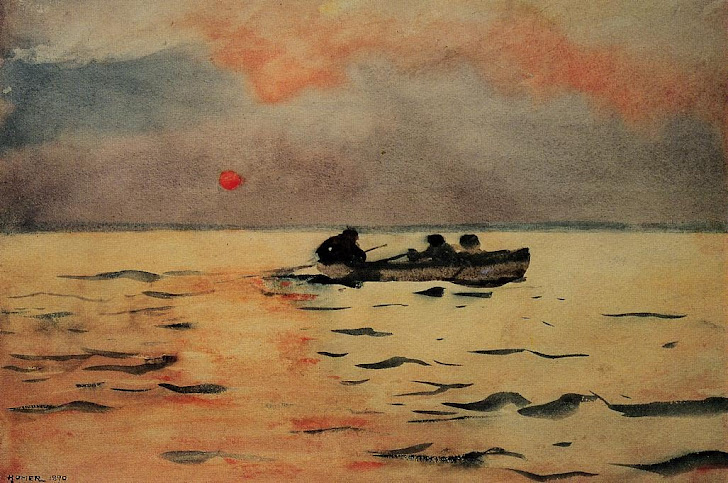The
debate over whether or not objective moral values exist—i.e., over whether it
is absolutely right or wrong (for humans, at least) to do certain things,
instead of this rightness or wrongness being somewhat or completely
subjective/relative—has been going on for so long that one has to begin
wondering about the persons involved on either side. It should not be so hard,
after all, to determine whether or not these values at least likely exist; at very least, over two
millennia of debating over these values ought to have got us somewhere more
productive. Clearly, however, it is not clear whether or not these values
exist, if these debates are still going so strong. And it would appear that we
are left with some rather disquieting options: firstly, that these values do
not exist, but that some of us would very much like them to, and this cognitive
dissonance leads us at times to conclusions further-fetched than any dog’s
Frisbee; or, secondly, that these values do
exist, and some of us simply do not want to admit it, since admitting it would
put some of us in an awkward position of ascertaining why these values exist
and whether or not they truly are the non-independent product of evolution.
I
do not like either of these positions, and so I propose a third way.
I
do not know if objective moral values exist, firstly, but—so as to not be in a
simple agnostic position—I propose that they probably do not. This is not a
claim of said values absolutely not existing, nor is it evidence that I believe
they do; it is simply an honest conclusion based on not being able to know that
they absolutely do and informed additionally by many observations: the presence
of many individuals throughout history who have not shown clear familiarity
with these supposed values (primarily those who show some kind of disorder or
psychopathy, such as serial killers); the existence of practices throughout
history by large societies that appear to directly violate these values (the
extraordinary daily mass-murder carried out by the Aztecs of thousands of
people so as to make the sun rise each day; the slave trades that have existed
throughout history, including the transatlantic trade, the so-called Islamic or
Turkish trade, the systems of the Romans and certain Africans prior to the
beginning of the transatlantic trade, etc.); and the fact that the idea that we
primates on our little planet amidst the vastness of the universe would be
given objective moral values (a claim
that seems utterly out of proportion with the size of the universe—even just
with our planet, considering we can only reside on a fraction of it. We are
duped, constantly, into thinking ourselves the biggest and baddest things on
the planet, if not in all the cosmos, when we owe our existence to, among much
else, microbes whose population inside and on one human alone [trillions,
literally] alone far outnumbers the population of humans worldwide. And what of Michael Ruse's scenario in "Is Rape Wrong on Andromeda," in which we find that it is possible that aliens on another world may be so different from us that "rape" may not be wrong to them--i.e., that our moral values are inherently grounded in our biology and thus that moral values become modified in the minds of differently designed intelligent creatures?).
 |
| Ruse, when not pondering alien rape. |
Basically:
if there are probably no objective values, it is still possible, given the
common humanity of humans across the world (i.e., the possession of human
attributes), to see how we can come together to create systems of how one
should act in a variety of situations so as to not cause unnecessary suffering
or so as to promote well-being because those two things can often be beneficial
to both individuals and groups associated with individuals. At the same time,
the fact that these systems sometimes appear rather differently in different
societies suggests that morality is not likely objective, but, rather, that
these basic practices involving self- and mutual interest can evolve, via the
construction of more complex civilizations (that may contain members of groups
radically different from our own), into systems of morality such as we see in
many legal systems today. (Or, there are many peaks on the moral landscape, à
la Sam Harris, who I think is mostly correct in his book of the same name.)
In such
civilizations, it is clear that random murder may simply cause problems for
said society, such as creating a bad perception in the eyes of other
civilizations that might trade with or otherwise help them, as well as
potentially creating situations of minor or significant chaos within the
civilization in which said random murder occurred. In other words, order and
the veneer of respect, even when the interests I mentioned earlier may be in
conflict between individuals, become more necessary in a more complex
civilization so that it will not fall apart—and it is critical to note that not
all members of said society will want to comply with the law not to kill, but
may nonetheless do so out of fear or the apparent necessity to keep order.
Here, then, we have the appearance of moral values in elaborate legal systems,
and yet the values themselves may not concretely exist but merely be beneficial
and useful was of acting.
 |
| Isaac and Abraham--sacrifice? Murder? |
It
is clear that this primitive benefits-based system does not work objectively.
While killing, generally speaking, can be shown relatively easily to be a
dangerous act, particularly for small populations, it is nonetheless clear that
ritual murder has been going on from the infancy of our species to today. Now,
there is a possible distinction to be made between “murder” and “ritual
killing,” since, in at least some cases, the persons to be ritually killed have
1) agreed to die and 2) may not even be looked upon as possessing the same
degree of intrinsic human worth as those performing the ritual.
The
idea (to make a bit of a hop) that values come from a god who simply is good (the way to get around the Euthyphro
dilemma) is problematic. For one, it is hard to imagine that jealousy and
genocide are “good” except in the minds of the sick or deluded, and yet the god
of the bible—if we assume this is the being in question—is explicitly jealous
and, on occasional, genocidal. That this god would regret making human beings
and wipe them out (as well as the majority of land-based animals, Noah’s story
regardless) with a flood is extraordinary, and yet it is this god, this god
equivalent to “good,” who we are to believe is the source of our moral values?
Please.
Furthermore, the
idea that this deity is good really
shows how desperate some philosophers and theologians can be. We have yet to
objectively prove that this deity—any deity—exists, and yet we are ready to
dress this deity with the most extraordinary attributes: omnibenevolence,
omnipotence, omniscience. Now, clearly the “goodness” of god that precedes the
existence of moral values is a nod towards his omnibenevolence. But god does
not have to be any of these omni- attributes to create the universe, if you
believe a god did. It is not necessary to even give god these attributes, and
omnibenevolence, even if we focus on Earth (and there is no reason to), is
either a lie or a ridiculous wishy-washy joke that only academics who have no
sense of life (no sense that, for instance, when you talk of murder, you are
speaking of actual people being
murdered) can attempt to simply brush aside the horrors on this planet and
claim omnibenevolent qualities in god. But say god is given these qualities. How
do they even coherently work together? It is clear that these three, combined
with the clear existence of pain and suffering on our planet, do not work
together, unless god is also omni-retarded—but that, surely, is not a
greatness-making property. There is a good reason Marcion believed the god of
the Old Testament a different being from that of the New. And the god of
neither demonstrates the omni-properties.
One
response, of course, is to say that we silly humans misunderstand
omni-properties. By taking them to illogical extremes (like saying that
omnipotence must mean the ability to not be omnipotent), we turn them into
something other than what they are. The first problem here is that no one has
witnessed or experienced these omni-qualities, so to claim that they cannot be
illogical is a bit much. When someone says they are not logically coherent,
this is because there appears to be a genuine issue of logic within their
properties, particularly when all three omni-properties coexist in one being.
Until we can examine such a being, it is rather audacious to claim that these
properties even exist and that they further must be logically coherent even if
they could exist.
It is still more
troubling to see such claims when they coexist with the claim that god cannot
be fully known or understood—and yet here we are trying to impose concrete
properties upon a being we do not even know exists. The only properties that I
do not at present contest in such a being, if it exists, are spacelessness and
timelessness—not because I think they would describe a god but because they are
not problematic in the same way if they do. (Though, seriously, what on Earth is a "spaceless" thing? This is quite literally impossible to imagine--nonsense in the Wittgensteinian sense and in other, more unkind, senses. Is God smaller than the smallest thing imaginable? If so--how pathetic. And I still don't understand what the devil the description is supposed to mean. "Timeless," similarly, if it is distinct from "eternal," does not make sense. Theologians and philosophers throw these words around, despite their not clearly meaning anything and thereby deceiving audiences with fancy-sounding empty words.) The most pressing property, connected most directly
to omniscience, is the claim that god is or has a mind, despite not being
composed of matter and thus not having a brain (which produces the mind, as far
as we can tell) in any form that we on Earth are presently familiar with.
At
least some deists have the honesty to posit a god and leave it at that, not
speculating on whether this god is good or evil or even anything like the god
of theists. Not that that solves anything, per se, not least of all that
trickiest of questions of how or what or where (we can continue) said deity is—but it’s better than the arrogant
pretty-damn-near certainty of certain philosophers.
 |
| Craig is trying wayyy too hard. |
I’m looking at you, Lane
Craig. I respect a lot of your work, good sir, but--yeesh.


